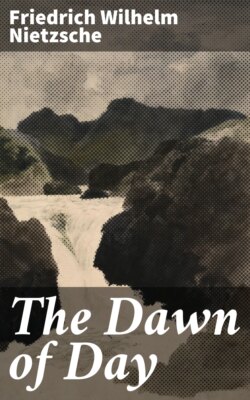Читать книгу The Dawn of Day - Friedrich Wilhelm Nietzsche - Страница 24
На сайте Литреса книга снята с продажи.
14.
ОглавлениеTable of Contents
The Signification of Madness in the History of Morality.—If, despite that formidable pressure of the “morality of custom,” under which all human communities lived—thousands of years before our own era, and during our own era up to the present day (we ourselves are dwelling in the small world of exceptions, and, as it were, in an evil zone):—if, I say, in spite of all this, new and divergent ideas, valuations, and impulses have made their appearance time after time, this state of things has been brought about only with the assistance of a dreadful associate: it was insanity almost everywhere that paved the way for the new thought and cast off the spell of an old custom and superstition. Do ye understand why this had to be done through insanity? by something which is in both voice and appearance as horrifying and incalculable as the demoniac whims of wind and sea, and consequently calling for like dread and respect? by something bearing upon it the signs of entire lack of consciousness as clearly as the convulsions and foam of the epileptic, which appeared to typify the insane person as the mask and speaking-trumpet of some divine being? by something that inspired even the bearer of the new thought with awe and fear of himself, and that, suppressing all remorse, drove [pg 021] him on to become its prophet and martyr?—Well, in our own time, we continually hear the statement reiterated that genius is tinctured with madness instead of good sense. Men of earlier ages were far more inclined to believe that, wherever traces of insanity showed themselves, a certain proportion of genius and wisdom was likewise present—something “divine,” as they whispered to one another. More than this, they expressed their opinions on the point with sufficient emphasis. “All the greatest benefits of Greece have sprung from madness,” said Plato, setting on record the opinion of the entire ancient world. Let us take a step further: all those superior men, who felt themselves irresistibly urged on to throw off the yoke of some morality or other, had no other resource—if they were not really mad—than to feign madness, or actually to become insane. And this holds good for innovators in every department of life, and not only in religion and politics. Even the reformer of the poetic metre was forced to justify himself by means of madness. (Thus even down to gentler ages madness remained a kind of convention in poets, of which Solon, for instance, took advantage when urging the Athenians to reconquer Salamis.)—“How can one make one's self mad when one is not mad and dare not feign to be so?” Almost all the eminent men of antiquity have given themselves up to this dreadful mode of reasoning: a secret doctrine of artifices and dietetic jugglery grew up around this subject and was handed down from generation to generation, together with the feeling of the innocence, even sanctity, of such plans and meditations. The means of becoming [pg 022] a medicine-man among the Indians, a saint among Christians of the Middle Ages, an angecok among Greenlanders, a Pagee among Brazilians, are the same in essence: senseless fasting, continual abstention from sexual intercourse, isolation in a wilderness, ascending a mountain or a pillar, “sitting on an aged willow that looks out upon a lake,” and thinking of absolutely nothing but what may give rise to ecstasy or mental derangements.
Who would dare to glance at the desert of the bitterest and most superfluous agonies of spirit, in which probably the most productive men of all ages have pined away? Who could listen to the sighs of those lonely and troubled minds: “O ye heavenly powers, grant me madness! Madness, that I at length may believe in myself! Vouchsafe delirium and convulsions, sudden flashes of light and periods of darkness; frighten me with such shivering and feverishness as no mortal ever experienced before, with clanging noises and haunting spectres; let me growl and whine and creep about like a beast, if only I can come to believe in myself! I am devoured by doubt. I have slain the law, and I now dread the law as a living person dreads a corpse. If I am not above the law, I am the most abandoned of wretches. Whence cometh this new spirit that dwelleth within me but from you? Prove to me, then, that I am one of you—nothing but madness will prove it to me.” And only too often does such a fervour attain its object: at the very time when Christianity was giving the greatest proof of its fertility in the production of saints and martyrs, believing that it was thus proving itself, Jerusalem [pg 023] contained large lunatic asylums for shipwrecked saints, for those whose last spark of good sense had been quenched by the floods of insanity.
